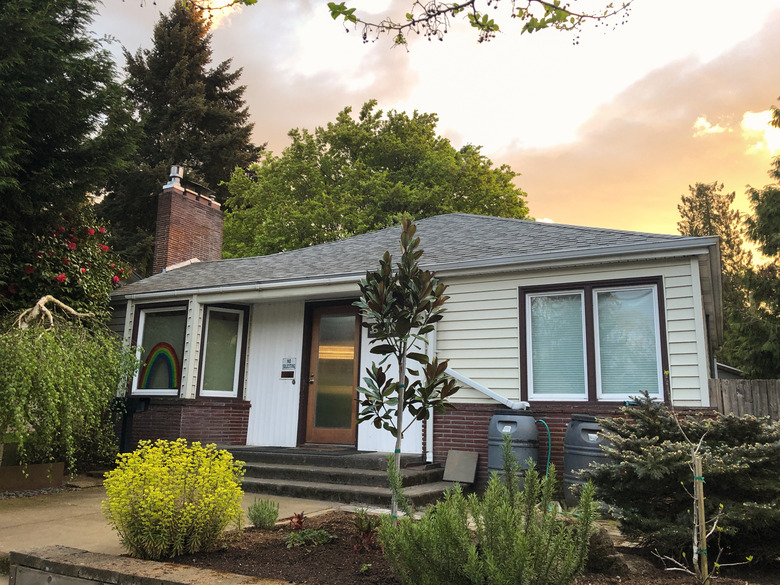7 Creative Ways To Save For A Down Payment
Buying a first home is a big, incredible step in anyone's life, but the finances can feel overwhelming, especially when you don't have enough in your savings account for a down payment. Home prices are high, and in some hot urban markets, they are sky high.
But the rise of home prices is just one issue. Many first-time homebuyers, especially millennials, are burdened with heavy student loan debt or credit card debt, and rent can be a major expense too. So, how is an ordinary human supposed to save for a down payment?
If necessity is the mother of invention, now's the time to get creative. Consider seven ways people can and do pull together enough money to make a down payment on a first home.
1. Get a Better Loan Option
1. Get a Better Loan Option
The standard down payment for a homebuyer has long been 20 percent of the price of the new home. The buyer puts in 20 percent, and the lender feels safe offering a mortgage for the other 80 percent of the price since it is already looking at 20 percent equity. If the lender has to foreclose, that 20 percent plus any upward momentum in the home value will probably keep the lender from losing money.
When home prices were $50,000, a 20 percent down payment seemed feasible. However, with the median home price on the rise that 20 percent is over the $100,000 mark. So, make it a point to look at other loan options. Turn over every stone in your search.
Luckily, you can go lower than 20 percent down even on conventional loans — but you'll need to be willing to pay private mortgage insurance, or PMI. Usually, PMI comes at an annual rate between 0.5 and 1.5 percent of your loan amount, and you have to pay monthly. The PMI payments continue from the time you buy until your equity in the property rises to 20 percent.
So, what kind of loans can you get with a lower down payment? It might surprise you how many options are available, but that makes sense when over 3/4 of all first-time homebuyers put down less than 20 percent. In fact, according to the National Association of Realtors, the median down payment by first-time homebuyers in 2019 was just 6 percent of the purchase price.
Most conventional loans will consider borrowers who put 5 percent down, while government loans require even less. Federal Housing Administration (FHA) loans will take a minimum down payment of only 3.5 percent, but you can still go lower. Fannie Mae and Freddie Mac have a loan program called "Conventional 97" where the homebuyer only needs to put down 3 percent. Some veterans can even get VA loans with no money down.
2. Seek Government Assistance
2. Seek Government Assistance
Why can't the government help first-time homeowners with their down payments? The happy fact is that it does. There are thousands of down payment assistance programs that assist homebuyers by offering grants, no-interest loans or low-interest loans to help them make their first down payment. Down payment assistance programs are out there to help a wide variety of buyers, including veterans, teachers, firefighters, first-time homebuyers and those with low income. Some are offered by nonprofits, but most are from municipal governments, counties, and states, and it is worth your while to track them down.
Since the programs vary widely among localities and states, making generalities is difficult, but typically, the down payment assistance programs fall into four main categories:
- Grants that do not require repayment.
- Loans that must be repaid together with the homebuyer's main mortgage.
- Loans that only have to be paid down when the homebuyer refinances or sells.
- Loans that are forgiven over a set period of time.
Generally, only first-time homebuyers are eligible — meaning someone who hasn't owned a home in the past three years. Sometimes, the assistance is only available to low-income or moderate-income borrowers buying a home in a qualified area as their primary residence. To learn more about this type of assistance, check out your state's Housing Finance Agency website.
3. Accept Family Gifts of Money
3. Accept Family Gifts of Money
Another option is to turn to the "parental bank" for down payment help. Parents as well as grandparents often help their adult kids buy a first home by gifting them down payment money. Across the country, parents are giving their adult children an average of $39,000 to help them buy a home. In fact, one in five homeowners received gifts to help them buy in 2018, with gifting — usually family gifting — underpinning the purchase of $317 billion of real property.
Do lenders object to gifting? Generally, they don't, although some decline a loan if all of the down payment comes from a gift. Lenders are wary of loans (that impact debt-to-income ratios), so you'll have to jump through hoops to show that the money was a gift. Remember that tax laws allow each person to give another person up to $15,000 per year without filing a gift tax return. If each parent of a couple took that step, the couple would have $60,000 in down payment money.
Gifts can't be from just anyone, however. Lenders want to be sure that there are no strings attached that might alter your debt-to-income ratio and thus your mortgage application. For conventional loans, the only gifts possible are from immediate family members and future (soon-to-be) family members, like future in-laws. The FHA allows friends, employers and charitable organizations to gift the down payment, but no one with an interest in the sale of the home can provide a gift, including either the real estate agent or the seller. You can explore the idea of crowdfunding your down payment, a new idea that has enthusiastic fans.
Tip
Note that if you are counting on your parents or grandparents' help with the down payment, you'll need to secure a "gift letter," where the givers state that the funds are indeed gifted and not loaned.
4. Tap Into Your Retirement Account
4. Tap Into Your Retirement Account
Many prospective homebuyers have money tucked away in their retirement accounts, like individual retirement accounts (IRAs) or 401(k) plans. If retirement is years away, it may seem tempting to tap into the funds now to help provide your required down payment. In fact, that is a real possibility.
Special IRA rules apply for first-time homebuyers, defined in this case as those who haven't owned a primary residence for two years. If you are in that category, you have the right to withdraw up to $10,000 from an IRA for a down payment without paying penalties that usually apply for early withdrawal. If you are part of a couple, each of you can do this up to a $10,000 lifetime limit. Check with an accountant or the IRS to see if you would have to pay income tax on the amount you withdraw.
And what about 401(k) accounts? Not every 401(k) plan is identical, so you'll need to explore this possibility with your employer. Some plans do allow an individual to borrow money from their own plan. There will be a maximum amount you can tap, and your employer is likely to have set other conditions. Under the tax code, you have a reasonable amount of time to repay the 401(k) loan.
5. Join the Gig Economy on the Side
5. Join the Gig Economy on the Side
While not as easy as tapping into an IRA or accepting a family gift, getting a side job is a time-honored way for first-time homebuyers to gather the funds for a down payment. The expanding gig economy provides opportunities to work on the side if and when you have time rather than on someone else's schedule. According to the Federal Reserve, some 30 percent of American adults work in the gig economy, often as a side hustle. Over a third of millennial homebuyers use second-job income to fund a down payment.
Working a second job is nobody's idea of fun, but think of it as a limited push to get to a major goal. While it isn't easy to pull that down payment together, getting a gig job with places like Uber and Lyft is easier than ever. If your current job schedule allows it, you could also take a part-time job in retail with set hours and predetermined pay. Another option is to sell some of your things to add money to your house fund — or sell your creations if you are an artist or other type of creative. Thanks to the internet, you can sell in your neighborhood or anywhere on the planet.
6. Cut Down the Rent
6. Cut Down the Rent
Wherever you live in the country, rent is likely to eat up a big chunk of your net monthly income. In expensive urban areas like Los Angeles (with a median rent of $2,395) and New York (with a median rent of $3,600), making rent can especially feel like you're perpetually unable to save.
If it's possible, downsize your space and save those bucks for a period of time, which will build up your savings account quickly. Another option is to move back in with your parents — and more adult children are doing this today than ever before.
Other options are out there, like taking in roommates or abandoning your current flat for one room in a shared apartment. If you have a great apartment in a popular city (and a very understanding landlord), consider renting out a room on Airbnb and put that money toward your down payment. Any bit of savings will help.
7. Lock Yourself Into Saving
7. Lock Yourself Into Saving
No matter what any financial expert says, it's not easy to put money aside. It's really hard to put a freeze on fun spending and instead stash your disposable income in a piggy bank. (And it can be particularly difficult, if not impossible, to save with rising costs of living and stagnant wages.)
But, if overspending is what's keeping you from saving money for a down payment, make it easier by signing up for any type of automatic savings plan offered by your employer. There are also apps you can download to help you save more, like rounding up your purchases and saving the change. Whichever you use, remember that you are more likely to succeed at saving money if you make it automated.
If that doesn't appeal to you and you have an iron will, you can certainly do it yourself. Institute a self-imposed spending freeze that limits outgoing money to absolute necessities. This isn't going to work for everyone, but if you are strongly disciplined, give it a try.
Whichever of these options appeals to you, keeping your eye on the prize — a home of your own — will give you inspiration. First-time homeowners pull together down payments every day, and you can get there too.


